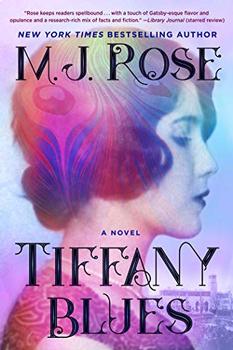Summary | Excerpt | Reading Guide | Reviews | Beyond the book | Read-Alikes | Genres & Themes | Author Bio

A Novel
by Suzanne RindellFor fans of The Talented Mr. Ripley and The Great Gatsby comes one of the most memorable unreliable narrators in years.
Rose Baker seals men's fates. With a few strokes of the keys that sit before her, she can send a person away for life in prison. A typist in a New York City Police Department precinct, Rose is like a high priestess. Confessions are her job. It is 1923, and while she may hear every detail about shootings, knifings, and murders, as soon as she leaves the interrogation room she is once again the weaker sex, best suited for filing and making coffee.
This is a new era for women, and New York is a confusing place for Rose. Gone are the Victorian standards of what is acceptable. All around her women bob their hair, they smoke, they go to speakeasies. Yet prudish Rose is stuck in the fading light of yesteryear, searching for the nurturing companionship that eluded her childhood. When glamorous Odalie, a new girl, joins the typing pool, despite her best intentions Rose falls under Odalie's spell. As the two women navigate between the sparkling underworld of speakeasies by night and their work at the station by day, Rose is drawn fully into Odalie's high-stakes world. And soon her fascination with Odalie turns into an obsession from which she may never recover.
Rindell's voice is like a cross between Merricat in Shirley Jackson’s overlooked masterpiece, We Have Always Lived in the Castle and Humbert Humbert in Nabokov’s Lolita. Her version of an unreliable narrator is less deft and layered than either of those books, but she has nonetheless constructed a suspenseful story with a propulsive pace...continued
Full Review
(693 words)
This review is available to non-members for a limited time. For full access,
become a member today.
(Reviewed by Amy Reading).
 Prohibition came into effect in January 1920, one year to the day after the Eighteenth Amendment was ratified. It was a victory for the Anti-Saloon League, which had campaigned since 1893 to outlaw alcohol in order protect women and children from the effects of drunken husbands and to increase productivity among workers.
Prohibition came into effect in January 1920, one year to the day after the Eighteenth Amendment was ratified. It was a victory for the Anti-Saloon League, which had campaigned since 1893 to outlaw alcohol in order protect women and children from the effects of drunken husbands and to increase productivity among workers.
But it was simultaneously a victory for the crafts of subterfuge and bribery. Prohibition was, of course, a gigantic opportunity for the underground economy, and bootleggers and gangsters took full advantage. Their payoffs to New York City officials totaled at least $60 million a year. Speakeasies ("blind pigs," "jimmies") bloomed on every street corner, each with its own way of outsmarting law enforcement. The 21 Club...
This "beyond the book" feature is available to non-members for a limited time. Join today for full access.

If you liked The Other Typist, try these:

by M.J. Rose
Published 2019
The New York Times bestselling author of The Library of Light and Shadow crafts a dazzling Jazz Age jewel—a novel of ambition, betrayal, and passion about a young painter whose traumatic past threatens to derail her career at a prestigious summer artists' colony run by Louis Comfort Tiffany of Tiffany & Co. fame. "[M.J. Rose] transports the ...

by Brendan Mathews
Published 2018
Three brothers caught up in a whirlwind week of love, blackmail, and betrayal culminating in an assassination plot, set in prewar New York.
There are two kinds of people in the world: those who divide the world into two kinds of people, and those who don'...
Click Here to find out who said this, as well as discovering other famous literary quotes!